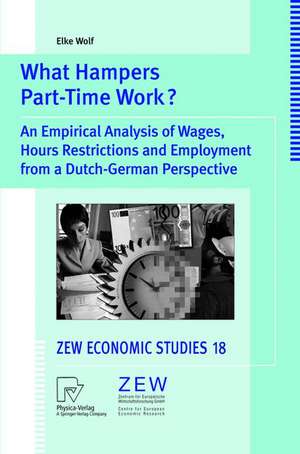What Hampers Part-Time Work?: An Empirical Analysis of Wages, Hours Restrictions and Employment from a Dutch-German Perspective: ZEW Economic Studies, cartea 18
Autor Elke Wolfen Limba Engleză Paperback – 10 dec 2002
Din seria ZEW Economic Studies
-
 Preț: 394.87 lei
Preț: 394.87 lei - 15%
 Preț: 644.18 lei
Preț: 644.18 lei -
 Preț: 379.30 lei
Preț: 379.30 lei -
 Preț: 387.75 lei
Preț: 387.75 lei - 15%
 Preț: 638.57 lei
Preț: 638.57 lei -
 Preț: 389.88 lei
Preț: 389.88 lei -
 Preț: 379.48 lei
Preț: 379.48 lei -
 Preț: 381.43 lei
Preț: 381.43 lei -
 Preț: 381.81 lei
Preț: 381.81 lei -
 Preț: 387.96 lei
Preț: 387.96 lei -
 Preț: 379.86 lei
Preț: 379.86 lei - 15%
 Preț: 643.34 lei
Preț: 643.34 lei -
 Preț: 390.25 lei
Preț: 390.25 lei - 15%
 Preț: 640.55 lei
Preț: 640.55 lei -
 Preț: 382.18 lei
Preț: 382.18 lei - 15%
 Preț: 632.70 lei
Preț: 632.70 lei -
 Preț: 385.84 lei
Preț: 385.84 lei - 15%
 Preț: 645.28 lei
Preț: 645.28 lei - 15%
 Preț: 640.88 lei
Preț: 640.88 lei -
 Preț: 386.61 lei
Preț: 386.61 lei -
 Preț: 380.07 lei
Preț: 380.07 lei - 15%
 Preț: 644.63 lei
Preț: 644.63 lei -
 Preț: 389.70 lei
Preț: 389.70 lei - 18%
 Preț: 945.79 lei
Preț: 945.79 lei - 15%
 Preț: 640.88 lei
Preț: 640.88 lei -
 Preț: 383.33 lei
Preț: 383.33 lei - 15%
 Preț: 638.11 lei
Preț: 638.11 lei - 15%
 Preț: 639.25 lei
Preț: 639.25 lei -
 Preț: 385.62 lei
Preț: 385.62 lei -
 Preț: 384.86 lei
Preț: 384.86 lei - 15%
 Preț: 638.57 lei
Preț: 638.57 lei - 15%
 Preț: 633.68 lei
Preț: 633.68 lei -
 Preț: 384.86 lei
Preț: 384.86 lei - 15%
 Preț: 635.15 lei
Preț: 635.15 lei - 15%
 Preț: 653.98 lei
Preț: 653.98 lei - 15%
 Preț: 636.30 lei
Preț: 636.30 lei -
 Preț: 382.18 lei
Preț: 382.18 lei - 15%
 Preț: 639.41 lei
Preț: 639.41 lei -
 Preț: 382.57 lei
Preț: 382.57 lei - 15%
 Preț: 639.59 lei
Preț: 639.59 lei -
 Preț: 389.49 lei
Preț: 389.49 lei - 15%
 Preț: 646.30 lei
Preț: 646.30 lei - 15%
 Preț: 638.43 lei
Preț: 638.43 lei - 15%
 Preț: 639.08 lei
Preț: 639.08 lei -
 Preț: 383.71 lei
Preț: 383.71 lei -
 Preț: 382.75 lei
Preț: 382.75 lei
Preț: 382.57 lei
Nou
Puncte Express: 574
Preț estimativ în valută:
73.24€ • 76.42$ • 61.39£
73.24€ • 76.42$ • 61.39£
Carte tipărită la comandă
Livrare economică 13-27 martie
Preluare comenzi: 021 569.72.76
Specificații
ISBN-13: 9783790800067
ISBN-10: 3790800066
Pagini: 188
Ilustrații: X, 174 p. 5 illus.
Dimensiuni: 155 x 235 x 10 mm
Greutate: 0.29 kg
Ediția:Softcover reprint of the original 1st ed. 2003
Editura: Physica-Verlag HD
Colecția Physica
Seria ZEW Economic Studies
Locul publicării:Heidelberg, Germany
ISBN-10: 3790800066
Pagini: 188
Ilustrații: X, 174 p. 5 illus.
Dimensiuni: 155 x 235 x 10 mm
Greutate: 0.29 kg
Ediția:Softcover reprint of the original 1st ed. 2003
Editura: Physica-Verlag HD
Colecția Physica
Seria ZEW Economic Studies
Locul publicării:Heidelberg, Germany
Public țintă
ResearchCuprins
1 Introduction.- 1.1 Motivation of the research questions.- 1.2 What we know about work-sharing.- 1.3 Description of the data used in this book.- 1.4 Structure of the book.- 2 The part-time wage gap in Germany and the Netherlands.- 2.1 Introduction.- 2.2 Why should wages depend upon hours worked?.- 2.3 Empirical methodology.- 2.4 The specification of the econometric model.- 2.5 Data sets, sample selection and definition of the variables.- 2.6 Descriptive figures on working hours and wages.- 2.7 Estimation results of the simultaneous model.- 2.8 Summary and conclusions.- 3 Does the part-time wage gap matter?.- 3.1 Introduction.- 3.2 Data and some descriptive analyses.- 3.3 The econometric model.- 3.4 Estimation results.- 3.5 Equalizing part-time and full-time wage rates.- 3.6 Summary and conclusion.- 4 Loosening hours restrictions.- 4.1 Introduction.- 4.2 German and Dutch employment systems and economic structures.- 4.3 Descriptions of the data sets.- 4.4 Comparing the match of desired and actual hours across countries.- 4.5 A model of actual working hours.- 4.6 Inference from the estimation results.- 4.7 Summary and conclusions.- 5 Final conclusions and policy implications.- A Appendix to Chapter 2.- A.1 Evaluation of the Likelihood Function.- A.2 Expected values of hourly wage rates in the simultaneous model.- A.3 Further empirical results.- B Appendix to Chapter 3.- B.1 The bootstrap method.- B.2 Orthogonalizing group-specific dummy variables.- B.3 Remarks on the German tax and benefit system.- B.4 Further empirical results.- C Appendix to Chapter 4.- List of Figures.- List of Tables.- References.
Textul de pe ultima copertă
This book contributes to clarify the conditions of jobs with shorter working hours and reckons the potential for increasing part-time employment in Germany. Two crucial obstacles of part-time employment are addressed: Firstly, the wage structure and its implications for labor supply, and secondly, the lack of job offers for part-time employees. The Netherlands - known as the first part-time economy in the world - is used as a benchmark for the German case. The empirical analyses in this book are based on representative household data for Gemany and the Netherlands.













